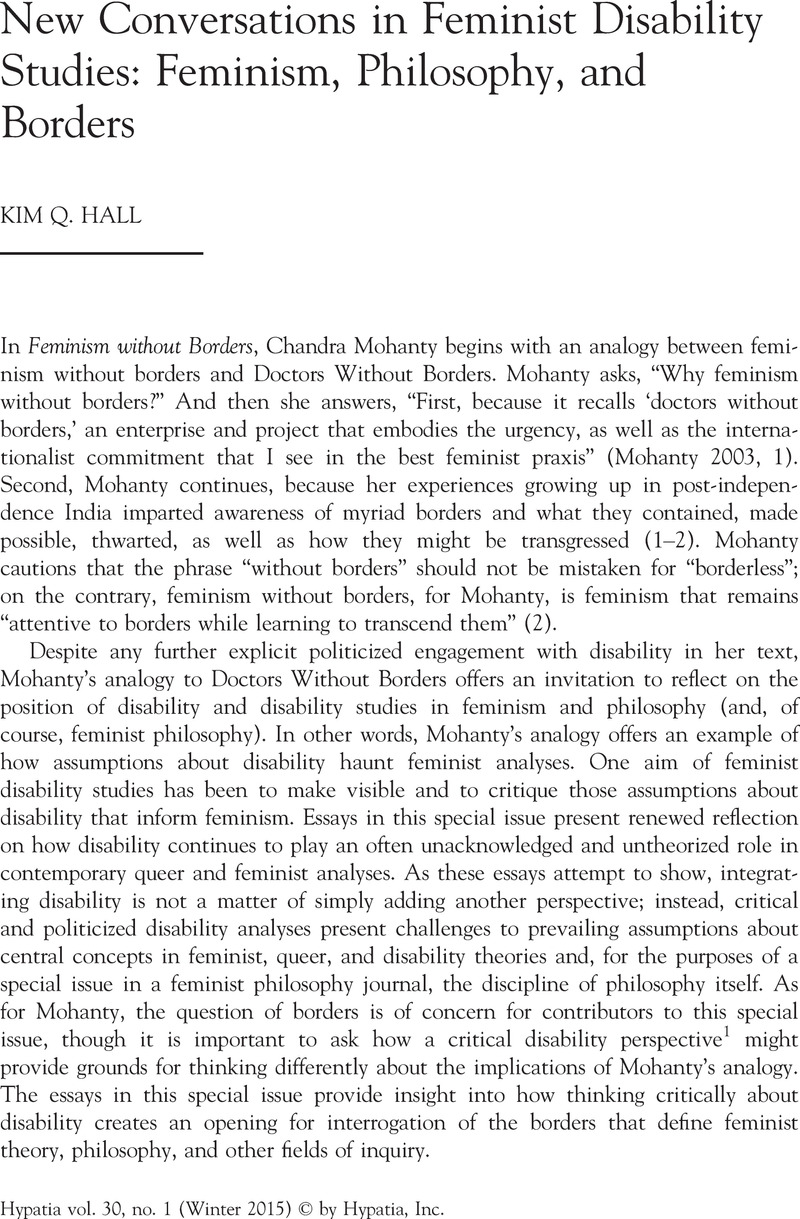Crossref Citations
This article has been cited by the following publications. This list is generated based on data provided by
Crossref.
Albanesi, Heather
Ferber, Abby
Herrera, Andrea O’Reilly
Nusbaum, Emily A.
and
Ware, Linda
2016.
Teaching Gender and Sex in Contemporary America.
p.
239.
Gherardi, Silvia
and
Rodeschini, Giulia
2016.
Caring as a collective knowledgeable doing: About concern and being concerned.
Management Learning,
Vol. 47,
Issue. 3,
p.
266.
Carlson, Licia
2016.
Feminist Approaches to Cognitive Disability.
Philosophy Compass,
Vol. 11,
Issue. 10,
p.
541.
Sargent, Christine
2019.
Situating Disability in the Anthropology of the Middle East.
International Journal of Middle East Studies,
Vol. 51,
Issue. 1,
p.
131.
Pino Morán, Juan Andrés
and
Tiseyra, María Victoria
2019.
Encuentros entre la perspectiva decolonial y los estudios de la discapacidad.
Revista Colombiana de Ciencias Sociales,
Vol. 10,
Issue. 2,
p.
497.
Gomes, Ruthie Bonan
Lopes, Paula Helena
Gesser, Marivete
and
Toneli, Maria Juracy Filgueiras
2019.
Novos diálogos dos estudos feministas da deficiência.
Revista Estudos Feministas,
Vol. 27,
Issue. 1,
Kafer, Alison
2020.
The Cambridge Companion to Queer Studies.
p.
93.
Núñez Parra, Lorena
2020.
Discapacidad y trabajo: la individualización de la inclusión bajo lógicas coloniales contemporáneas.
Nómadas,
p.
61.
Wilton, Robert
and
Fudge Schormans, Ann
2020.
‘I think they're treating me like a kid’: intellectual disability, masculinity and place in Toronto, Canada.
Gender, Place & Culture,
Vol. 27,
Issue. 3,
p.
429.
O’Shea, Amie
and
Frawley, Patsie
2020.
Gender, sexuality and relationships for young Australian women with intellectual disability.
Disability & Society,
Vol. 35,
Issue. 4,
p.
654.
Alomar, Maisam
2020.
“This Isn’t the South Bronx”.
Social Text,
Vol. 38,
Issue. 3,
p.
27.
Sadiki, M. Christinah
Watermeyer, Brian
and
Abrahams, Nina T.
2021.
Transitioning to a life with disability in rural South Africa: A qualitative study.
African Journal of Disability,
Vol. 10,
Issue. 0,
Freitas, Marcos Cezar de
and
Santos, Larissa Xavier dos
2021.
INTERSECCIONALIDADES E A EDUCAÇÃO ESPECIAL NA PERSPECTIVA DA EDUCAÇÃO INCLUSIVA.
Cadernos de Pesquisa,
Vol. 51,
Issue. ,
Giulia Bernardini, Maria
2022.
Persone con disabilità e diritti umani: relazioni problematiche.
SOCIOLOGIA DEL DIRITTO,
p.
110.
Bouchet, Célia
2024.
Incorporating disability within intersectional analysis: general challenges and French specificities.
French Politics,
Kelly, Caroline
Sharma, Shivani
Jieman, Anna-Theresa
and
Ramon, Shulamit
2024.
Sense-making narratives of autistic women diagnosed in adulthood: a systematic review of the qualitative research.
Disability & Society,
Vol. 39,
Issue. 3,
p.
663.
Greco, Cinzia
2024.
Woman in the brain, or the fraught relationship between feminism and mental health.
Medical Humanities,
p.
medhum-2024-013033.
